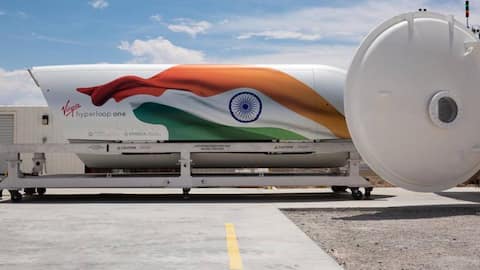Bengaluru Airport to city in 10-minutes? Virgin Hyperloop studying feasibility
What's the story
The concept of hyperloop is often seen as the future of high-speed transit, but California-based Virgin Hyperloop is looking to make it a reality now.
Case in point: A new project the company has announced to explore the possibility of building a hyperloop link in Bengaluru, the technology hub of India.
Here is all you need to know about it.
Agreement
Virgin Hyperloop, BIAL sign MoU
On Sunday, Virgin Hyperloop and the Bangalore International Airport Limited (BIAL) signed a Memorandum of Understanding (MoU) to conduct a feasibility study for a proposed hyperloop corridor.
Under this, the companies will look at various aspects that need to be considered for building a hyperloop link between the Kempegowda International Airport, managed by BIAL, and the Bengaluru city center.
Details
Two phases of study, each requiring six months
As part of the partnership, the two organizations will explore technical, economic, and route feasibility for the hyperloop corridor.
The work will be conducted across two phases, with each one lasting for about six months, according to the MoU exchanged between Sultan bin Sulayem, the Chairman of Virgin Hyperloop, and BIAL chairman TM Vijay Bhaskar at a virtual event.
Possibility
This will cut down the travel time to 10 minutes
If the project moves ahead and a hyperloop line is indeed built, the travel time between the airport and the city center of Bengaluru could be cut down to just 10 minutes.
Currently, covering the 35-40km distance between the two places takes between 1 to 2 hours, depending on the traffic in the region and the time of the day.
Quote
"Feasibility study is a step toward mobility of the future"
"The commissioning of a feasibility study for hyperloop connectivity from BLR Airport is another major step toward building the infrastructure required to define mobility for the future, enabling the efficient movement of people," Bhaskar said in a statement.
Technology
How exactly hyperloop transit works?
At its core, hyperloop is a sealed tube with low air-pressure which may allow a pod to travel substantially free of air resistance or friction.
Virgin Hyperloop, one of the many companies exploring this technology, believes that a hyperloop transit system could transport thousands of people at speeds up to 1,080 km/hr while also being extremely energy efficient at the same time.
Other benefits
Other benefits of embracing hyperloop
Hyperloop could also enable quick cargo movement as well as reduce traffic congestion on the roads.
"Karnataka is embracing hyperloop as a way to keep pace, support clean growth, and open new opportunities for the city," said Virgin Hyperloop CEO Jay Walder. "A hyperloop-enabled airport would not only allow for faster travel times, it would create a 21st-century passenger experience and expand airport capacity."
Quote
Here's what BIAL CEO Hari Marar said on the MoU
"We are excited to take this landmark step...Technological innovation is key to building and sustaining a world-class transportation hub, and this study is an important step forward. This mode of transportation offers an enormous economic potential, connecting passengers at unprecedented speeds, with zero emissions."
